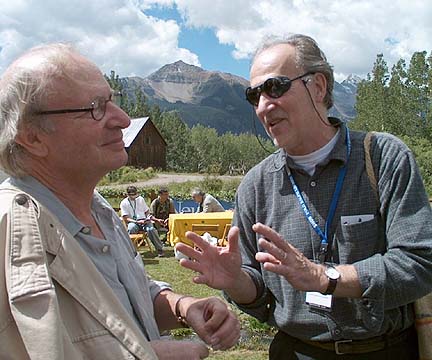There is no such thing as a casual conversation with Werner Herzog. When I run into him at a film festival my heart quickens, because I know I am going to be told amazing things, all delivered with the intense air that we are sharing occult knowledge.
Here he is sitting in front of me at the Telluride Film Festival, next to Andre Gregory, of “My Dinner with Andre.” If Andre had dinner with Werner, it would last a week.
Herzog’s latest film “Little Dieter Needs to Fly,” opens Friday in Chicago at Facets. It is the story of a German who joined the U.S. Air Force, was shot down in Vietnam, and underwent jungle experiences so harrowing that at one point he essentially invited a snake to devour him, and the snake declined.
Herzog himself always looks as if he has just trekked out of the rain forest, and often has. “You look thin,” I told him.
“I returned a week ago from Peru,” the German director said, nodding. “I lost 20 pounds. I hacked my way through the jungle. I am making a film about a doomed aircraft flight that I was almost a passenger on. It was the day before Christmas. I paid $20 to the clerk as a bribe. She promised me I had a seat. But this airline, almost all of their planes were grounded, and in the rush I did not get my seat after all.
“The plane went down in the jungle. After a week the search was called off. After eleven and a half days, a young girl crawled out of the jungle. She was the only survivor. I took her back to the site of the crash, which was very hard to find. At the same time, I revisited the locations of my movies ‘Aguirre, the Wrath of God’ and ‘Fitzcarraldo’–where I pulled the steamship through the jungle.”
He shrugged. “All overgrown now. No sign that anyone was ever there.”
Both of those films starred Klaus Kinski, he of the fearsome countenance, who fought bitterly with Herzog. There is a story that Herzog pulled a gun on Kinski and ordered him to work or be killed. There is also the story (documented in Les Blank’s documentary “Burden of Dreams“) that Herzog refused to use models and special effects. He insisted on building a real steamship and really pulling it through the real jungle with real ropes and winches, and when the German engineers predicted that the ropes would snap and whip around and cut everyone in two, Herzog simply sent the engineers home.
“A native Indian offered to kill Kinski for me,” Herzog told me, as we still stood in the aisle at Telluride. “Which I had to decline, because I needed him.”
A few years ago at Telluride, Herzog showed me tapes of two recent documentaries he had made, one about the Jesuses of Russia –men who dress as Jesus and walk the streets — and another about villagers who believe that if they crawl out onto a lake when the ice is still thin enough, they can see the angels who live in the city under the water.
They were both astonishing documentaries. The Jesuses reminded me of the story in Salman Rushdie’s novel The Moor’s Last Sign about the Lenins of Russia — actors who dressed as Lenin and recited his memorized speeches, so peasants could get the message in the age before television. The difference between the Lenins and the Jesuses is that the Lenins presumably existed but the Jesuses were made up. Herzog’s “documentary” was fiction.
Herzog moves freely through the spheres of fact, fiction, legend, myth and invention. He is the first to tell you that not every detail of “Little Dieter Needs to Fly” is ice-cold documentary fact. Yes, that is really Dieter on the screen, and yes, he was really shot down in Vietnam and underwent horrifying experiences. But his image of Death as a jellyfish? “I found it for him,” Herzog says.
He is willing to push beyond documentary fact, he says, in his quest for underlying truth.
“The weakness of cinema verite documentaries is that they can never go any deeper. They can only reach the surface of what constitutes truth in cinema. Deeper truth can only be found in poetry, because then you start to fabricate. The world is simply there. It is what men find in it and bring to it that is truth. I am in search of the fathomless.”
Was he really scheduled to be a passenger on that doomed flight? I believe him.












